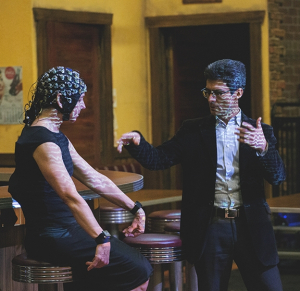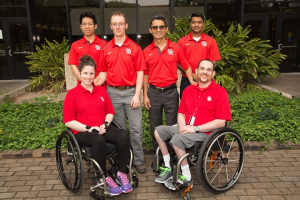UH Engineer Contreras-Vidal Recognized for Research to Help Patients Regain Mobility
Jose Luis “Pepe” Contreras-Vidal, Hugh Roy and Lillie Cranz Cullen distinguished professor of electrical and computer engineering at the UH Cullen College of Engineering, has been named a 2019 Fellow of the Institute of Electrical and Electronics Engineers (IEEE). He is being recognized for his research contributions involving brain-machine interfaces (BMI) and wearable exoskeletons.
The honor is the IEEE’s highest grade of membership and is reserved for those with “an outstanding record of accomplishments” in an IEEE field. No more than one-tenth of 1 percent of IEEE’s voting members can be named Fellows in a given year.
“The research for which I am being recognized could not have been accomplished without the work of many talented students, postdocs, university colleagues and clinical partners from the Texas Medical Center, and the volunteers who have participated in our research,” Contreras-Vidal said. “I also appreciate the financial support from federal agencies, foundations and industry that made the research possible.”
Contreras-Vidal is one of the world's leading researchers in the field of noninvasive brain-machine interfaces. He has been featured in national and international media for his thought-controlled robotic exoskeleton, which can help paralyzed patients regain their mobility. He also leads in the translation of clinical BMI systems to patients with paralysis and limb amputation.
In 2010, Contreras-Vidal was the first to demonstrate EEG-based neural decoding of 3D center-out hand movement kinematics from the fluctuations in the amplitude of slow cortical potentials in the delta (0.1-4 Hz) band. His breakthrough research has enabled significant advances in the design of noninvasive closed-loop, real-time, BMIs to robotic prosthetic limbs and powered exoskeletons for people with spinal cord injury, stroke and limb amputations.
Contreras-Vidal’s research team is now developing neurotechnology designed to help young children with disabilities. Clinical trial of the pediatric exoskeleton are expected to begin in the spring of 2019.
The team also continues to study brain-computer interfaces in connection to the arts to further understand creativity and innovation, as well as develop BMI-based innovations to improve education, artistic endeavors and art therapy.
Contreras-Vidal is also the director of the Building Reliable Advancements in Neurotechnology (BRAIN) Center at UH and the principal investigator for a NSF-funded Research Experiences for Undergraduates (REU) program – titled Neurotechnologies to Help the Body Move, Heal and Feel Again – that trains the next generation of engineers.
He is very involved with the IEEE, serving as an associate editor of the IEEE Transactions on Human Machine Systems. He is also a member of the IEEE Systems Council AdCom, the Engineering in Medicine and Biology (EMBS) Society, the Systems, Man and Cybernetics (SMC) Society, the Robotic and Automation Society (RAS) and IEEE Brain.
Contreras-Vidal earned an engineer’s degree in electronics and communication from the Monterrey Institute of Technology in Mexico, a master’s in electrical engineering from the University of Colorado Boulder and a Ph.D. in cognitive and neural systems from Boston University.
IEEE is the world’s leading professional association for advancing technology for humanity. Through its 400,000 plus members in 160 countries, the association is a leading authority on a wide variety of areas ranging from aerospace systems, computers and telecommunications to biomedical engineering, electric power and consumer electronics. To learn more about IEEE or the IEEE Fellow Program, please visit www.ieee.org.

